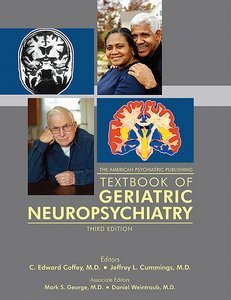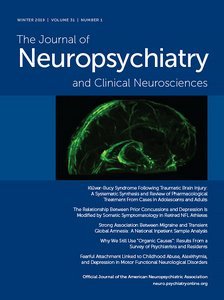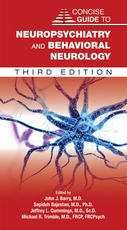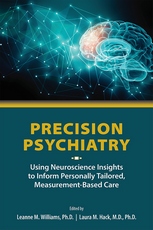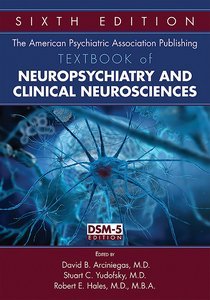The American Psychiatric Publishing Textbook of Geriatric Neuropsychiatry, Third Edition
View Pricing
Description
The third edition of the popular Textbook of Geriatric Neuropsychiatry thoroughly reviews this clinical subspecialty devoted to the diagnosis and treatment of psychiatric and behavior disorders in aging patients who display impaired brain function. In this text, world-renowned neuropsychiatrists and neuroscientists provide practical application of the latest research for both experienced clinicians and those new to the study of neuropsychiatry for the elderly. The book provides a comprehensive approach to treatment and contemporary neuroscience:
- Addresses the reality of an increasing aging population and the accompanying psychosocial changes this brings for patients and caregivers.
- Focuses on the health care of patients with neuropsychiatric illness.
- Consolidating the continued explosion of neuroscience research and the understanding of human behavior as it relates to aging.
- Bridges the fields of geriatric neurology and geriatric psychiatry, emphasizing relationships between neuropsychiatric illness and the aging of the nervous system.
- Responds to advancements in the study and science of geriatric neuropsychiatry, as well as feedback from past readers and clinicians.
Concise and organized for easy reference, the textbook is divided into four parts that disclose clinically relevant information within the context of the very latest in neuroscience research and clinical application, including:
- Clinical definitions of the essential neuropsychiatric syndromes and disorders commonly seen in the elderly and how these disorders manifest.
- Emphasis on the principles and special considerations essential for the safe and effective treatment of neuropsychiatric disorders in the elderly.
- Study of the importance of interactions among aging; psychosocial, family, and neuropharmacological elements; and brain stimulation therapies.
- In-depth review of the influence of the aging nervous system on the pathophysiology, neuropsychiatric manifestations, clinical course, and prognosis of neurological and psychiatric illness in the elderly.
Geriatric neuropsychiatry is an integrative specialty that draws from a diversity of fields including psychiatry, neuropsychiatry, neuroimaging, neuropsychopharmacology, gerontology, genetics, and molecular biology, to name a few. Incorporating these perspectives, this text is highly recommended for psychiatrists, neurologists, psychologists, geriatricians, psychiatric nurses, residents and fellows, and other clinicians interested in the study and treatment of the effects of aging on the brain.
Contents
- Contributors
- Preface
- Part I: Introduction to Geriatric Neuropsychiatry
- Chapter 1. Geriatric Neuropsychiatry
- Chapter 2. Neurobiology of Aging
- Chapter 3. Neurobiological Basis of Behavior
- Part II: Neuropsychiatric Assessment
- Chapter 4. Neuropsychiatric Assessment
- Chapter 5. Neuropsychological Assessment
- Chapter 6. Imaging the Structure of the Aging Human Brain
- Chapter 7. Molecular Imaging in Neuropsychiatry
- Part III: Principles of Neuropsychiatric Treatment
- Chapter 8. Psychosocial Therapies
- Chapter 9. Geriatric Neuropsychopharmacology
- Chapter 10. Electroconvulsive Therapy and Related Treatments
- Chapter 11. Brain Stimulation Therapies: Vagus Nerve Stimulation, Transcranial Magnetic Stimulation, Transcranial Direct Current Stimulation, and Deep Brain Stimulation
- Chapter 12. Cognitive Impairment and Rehabilitation
- Chapter 13. Neuropsychiatry in the Long-Term-Care Setting
- Chapter 14. Ethical and Legal Issues
- Part IV: Neuropsychiatric Syndromes and Disorders
- Chapter 15. Delirium
- Chapter 16. Alzheimer's Disease and the Frontotemporal Dementia Syndromes
- Chapter 17. Addiction
- Chapter 18. Sleep Disorders
- Chapter 19. Mood Disorders
- Chapter 20. Anxiety Disorders
- Chapter 21. Psychosis
- Chapter 22. Contemporary Personality Psychology
- Chapter 23. Pain
- Chapter 24. Parkinson's Disease and Movement Disorders
- Chapter 25. Cerebrovascular Disease
- Chapter 26. Traumatic Brain Injury
- Chapter 27. Epilepsy
- Chapter 28. Neoplastic, Demyelinating, Infectious, and Inflammatory Brain Disorders
- Chapter 29. Neuropsychiatric Disorders Associated With General Medical Therapies
- Index
Contributors
- Olusola Ajilore, M.D., Ph.D.
Karen E. Anderson, M.D.
Carmen Andreescu, M.D.
David B. Arciniegas, M.D., F.A.N.P.A., C.B.I.S.T.
Alon Y. Avidan M.D., M.P.H.
John J. Campbell III, M.D.
Michael R. Clark, M.D., M.P.H.
C. Edward Coffey, M.D.
M. Justin Coffey, M.D.
Paul T. Costa Jr., Ph.D.
Jeffrey L. Cummings, M.D.
D.P. Devanand, M.D.
Marie A. DeWitt, M.D.
Amelia N. Dubovsky, M.D.
Steven L. Dubovsky, M.D.
Richard B. Ferrell, M.D.
Norman L. Foster, M.D.
Mark S. George, M.D.
Stacey Gramann, D.O., M.P.H.
Edmund S. Higgins, M.D.
Ricardo E. Jorge, M.D.
Jennifer M. Keller, Psy.D.
Charles H. Kellner, M.D.
Anand Kumar, M.D.
Eric J. Lenze, M.D.
Daniel C. Marson, J.D., Ph.D.
Thomas W. McAllister, M.D.
Robert R. McCrae, Ph.D.
Glenise McKenzie, R.N., Ph.D.
Mario F. Mendez, M.D., Ph.D.
Ziad H. Nahas, M.D.
David W. Oslin, M.D.
Kenneth Podell, Ph.D.
Richard E. Powers, M.D.
John M. Ringman, M.D., M.S.
Robert G. Robinson, M.D.
Adam Rosenblatt, M.D.
Quincy M. Samus, Ph.D.
Douglas W. Scharre, M.D.
Andrew D. Siderowf, M.D., M.S.C.E.
Andrea C. Solomon, Ph.D.
Linda Teri, Ph.D.
Alexander I. Troster, Ph.D., A.B.P.P.(CN)
Larry E. Tune, M.D., M.A.S.
Harry V. Vinters, M.D.
Elena Volfson, M.D., M.P.H.
Julie Loebach Wetherell, Ph.D.
Daniel Weintraub, M.D.
Hal S. Wortzel, M.D.
About the Authors
C. Edward Coffey, M.D., is the Vice President of Henry Ford Health System, where he is also Chief Executive Officer of Behavioral Health Services; Kathleen and Earl Ward Chair of Psychiatry at Henry Ford Hospital; Director of the Center for Brain Stimulation Therapies at Henry Ford Hospital; and Professor of Psychiatry and of Neurology at Wayne State University (Henry Ford Campus) in Detroit, Michigan.
Jeffrey L. Cummings, M.D., is the Director of the Cleveland Clinic Lou Ruvo Center for Brain Health and the Andrea and Joseph Hahn Chair of Neurotherapeutics at the Cleveland Clinic Neurological Institute in Las Vegas, Nevada; Cleveland, Ohio; and Westin, Florida.
Related Products
Carousel Control - items will scroll by tabbing through them, otherwise arrows can be used to scroll one item at a time
